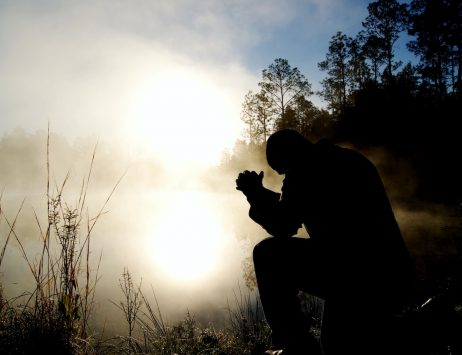As a little girl growing up in a Catholic home, I listened with wonder to the stories of the saints who would see Mary appear to them and give them a message for the world. I would hear stories of dancing suns and weeping statues and hope that one day I might see a tear fall from Mary’s face on her statue at our local parish. I remember marveling at the notion that Jesus appeared to St. Faustina, with His message of divine mercy and praying for such things to happen to me. I vividly remember looking out my window at a starry sky praying to God that He might appear to me that night . . . adding the caveat that He would have to appear in a way that wouldn’t scare me.
This, all coming from the little girl who often wondered about the mystery of God. I recall after catechism classes, asking my mom questions like, “If God created me, then who created God?” or “If bread comes from wheat, and wheat comes from the ground, and God made the Earth and put the wheat there, where did the material He made it all with come from?” My mother, full of holy patience, heard these questions and reminded me often of the fact that we can’t fully comprehend the whole mystery of God.
Behind desires and questions like these wasn’t resentment for God’s mystery, but rather, a yearning which remains to this day: a yearning to know Him—a knowing which requires a real-life, concrete experience with Him. If I was frustrated about anything, it was about the conflict I perceived when the Church taught me to seek a relationship with the Lord but insisted that He was a mystery beyond my comprehension.
The Incarnation of Jesus, however, proves that the mystery of God does not mean we’re unable to know Him in a real-life, concrete way. He walked this Earth. He ate meals with friends. He laughed at jokes. He wept when He was confronted with tragedy. He held people He was close to. Jesus’s ministry here on Earth proves that our God is not content to remain far off in some abstract, mysterious way. It proves that He desires to walk with us, to share space with us, to laugh at our jokes and quirks, to suffer with us when we face heartbreak, and to hold us close. Through the sacramental life of the Church, we are deeply privileged to participate in this closeness in a number of ways, but perhaps one of the most practical, simple, and honest ways that we can begin is by prayerfully seeking a relationship with this God through His very Word—through divine Scripture.
Praying with Scripture is more than simply reading a book or processing information. It’s an invitation to intimacy with the God who transcends our ways, a call to know His heart; and not just in some abstract mysterious way but personally. For my seeking self, my favorite way to pray with Scripture is with the gospels. It’s where I can, in my day-to-day life, spend time with the incarnate God, this Jesus, who actually wants a real-life relationship with me.
When I started to pray with the gospels daily, my life changed. It changed, not because I acquired more information about Jesus, my Catholic faith, or Scripture; but because with every paragraph I prayerfully spent time with, I actually got to encounter the Jesus I wanted to appear to me as a little girl; I was able to truly know this God who I had been tempted to believe remained in the distant unknown. Spending just a little bit of time each day with Jesus in the gospels has helped me to know Him more, love Him more, learn the sound of His voice, and conform my will to His.
A simple invitation of the Holy Spirit, opening up Matthew, Mark, Luke, or John, and encountering the God who became man and died for me has given me great hope in seasons of disappointment, consolation in moments of chaos, and a closeness to the one Person who changes everything for me.
If you know a teenager who is interested in praying with Scripture more, encourage them to check out Lectio Live, a live-streamed Bible study hosted by Leah Murphy and Josh Rogers on Life Teen’s YouTube Channel.



